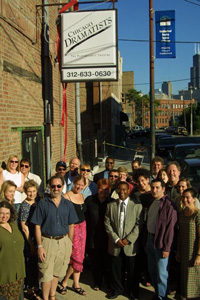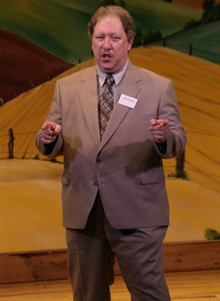
In terms of organization and real estate, Chicago Dramatists is a relatively small operation, but it is a giant in its ongoing pursuit of introducing new plays and playwrights to the theatre world. Where some companies focus on an ensemble of actors such as Steppenwolf, others specialize in daring directorial innovations. At Chicago Dramatists, the star is the playwright. As Managing Director Brian Loevner puts it succinctly, "We are a clearing house for playwrights. Not only do we provide a quality creative product for theatergoers, we also provide a service to the theatre community as a whole."
Brian notes that working with several hundred playwrights each year gives Chicago Dramatists an opportunity to affect hundreds of thousands of playgoers not only in Chicago, but throughout the country and across the world. "The theatre could not survive without writers," he says. "We provide an essential service and in taking the risk to support an organization like Chicago Dramatists and to send your support to new work can be a very exciting time for an audience. You get to follow a play from its birth onto its life in the theatre world. And we think that is very exciting."
Many people in the theatre community agree, and as Chicago Dramatists prepares to enter its 30th anniversary season this month, it does so with an unprecedented number of Jeff Award nominations, critical acclaim and growing audiences to its credit. Dramatists produced two of the finest shows, Cadillac and A Steady Rain of last season. The latter transferred to an extended commercial run at the Royal George Theatre while the expectation that the show will eventually reach New York continues. And just as the company at 1105 W. Chicago Avenue prepares to unveil its three play 2008-2009 season, so are many of the plays and playwrights that have been nurtured and originated in Chicago are in production throughout the country.
Chicago Dramatists began as a collective of playwrights in 1979 who, having taking a class at Victory Gardens Theater under playwright Jeffrey Sweet's tutelage, decided to start a company dedicated entirely to original work. It was something few professional companies had the chutzpah to try, but the demand for new plays has ensured Chicago Dramatists a long and successful run. Russ Tutterow was first invited to direct a staged reading for the burgeoning company in 1981 and became its first Artistic Director in 1986. He continues in that role today, with the support of Loevner, who joined as Managing Director in the fall of 2004, two other full time employees, two part-time staffers and a battery of volunteers and interns.
 "What has always been true at Chicago Dramatists," Russ explains, "is that we've been lucky to work with terrific playwrights. A lot of new playwrights have come to town during the 80's and 90's right up to today. We just took on six new residents playwrights and we take on more every year." Russ described the process of bringing playwrights into the organization. There are two core memberships, one being the Resident Playwright program, and the other being a Playwrights Network. "The Resident Playwrights is a competitive program," Russ says. "Plays are submitted once a year, we read them and judge whether this is someone we want to add to the residency. Resident Playwrights are expected to have some level of professional accomplishment in order to apply for the program. We look for people who have already been out there a bit and have a body of work. We always prefer to work with a playwright rather than a particular play because we want to work with playwrights over a long period of time."
"What has always been true at Chicago Dramatists," Russ explains, "is that we've been lucky to work with terrific playwrights. A lot of new playwrights have come to town during the 80's and 90's right up to today. We just took on six new residents playwrights and we take on more every year." Russ described the process of bringing playwrights into the organization. There are two core memberships, one being the Resident Playwright program, and the other being a Playwrights Network. "The Resident Playwrights is a competitive program," Russ says. "Plays are submitted once a year, we read them and judge whether this is someone we want to add to the residency. Resident Playwrights are expected to have some level of professional accomplishment in order to apply for the program. We look for people who have already been out there a bit and have a body of work. We always prefer to work with a playwright rather than a particular play because we want to work with playwrights over a long period of time."
It's an exclusive program, Russ says, which currently counts 40 members. The Playwrights Network, on the other hand, is open to anyone from anywhere in the country at any time. Membership, currently at around 200 playwrights, costs $200 a year and guarantees its participants the chance to have their work read and evaluated by the resident professionals. Works that are deemed to have production potential are given readings and often workshops, based on individual needs and the playwright's stage of writing maturity. Readings account for a big degree of what Chicago Dramatists does, and Russ stresses the unique challenges of play readings verses fully staged productions.
"Directing and acting in a reading is a little like summer stock, you just have to make it happen right now. You tend to focus on the text. Directing a reading is definitely its own art form or craft. You have to realize there are only so many things you can do. Where people sometimes make mistakes with readings is trying to direct a production. You want to give the audience just a sense of what's going on physically so they can figure it out themselves. The real key to doing a good job directing a reading is casting the best actors, who can make things happen instantly." Russ accounts for the short time commitment in acquiring some of the best talent in town, and he notes that giving them good scripts to read always helps. Chicago Dramatists employs an even mix of Equity and non-Equity actors, so younger thespians have the opportunity to learn from veteran professionals.
Readings are offered to the public most every Saturday at 2:00 p.m. There are also various classes, workshops and an outreach program to Chicago public schools where juniors and seniors are taught the craft of playwriting by industry professionals. As Brian says, "Simply getting people to realize how much work we do here is a challenge. Marketing new work to an audience is certainly a challenge. When you are an organization that only does original pieces, you have nothing to fall back on. Many organizations can say, ‘We're doing Our Town this year and everyone knows Our Town so we're going to have an automatic recognition to pull people in.' Each year I look at the slate of plays Russ has chosen for us and I say to myself, ‘No one has ever heard of any of these plays'. So I have to start completely fresh. And I have to experiment with target marketing to specific audiences I think the plays will speak to. I also have to look at our dedicated audience of theatergoers who enjoy the experience of new work, who are willing to take a risk on a regular basis."
Brian acknowledges that not everything that reads well on paper translates to a great performance onstage. "You never know what's going to happen when you do new work. That's the exciting part of what we do. We really don't know what we're going to end up with because the play is being re-written and re-shaped throughout the rehearsal process. When you have a hit like A Steady Rain or Cadillac, you see how visceral the reaction can be from people when they see something so exciting that they've never seen before." Russ notes the collaborative process of bringing these original works to life, and the importance of communicating with the playwright. "Over the years I have tried to figure out the most productive and encouraging ways to talk to a playwright. Sometimes you've got to simply react, reflect the play back to them. ‘This is what I got out of it, this is what involved me, this is how I felt at this point.' We tend to do that more and not tell a playwright how to write a play, because if I tell a playwright how I think they should write their play, then maybe I should go off and write my own."
Russ quickly admits that writing his own play has never been an option, and supports a view he learned in college. "I think directors are interpretive artists and the playwright is the creative artist in the theatre." Russ is happy to serve the playwrights he works with, three of whom are showcased with fully staged productions this season. On September 25 and 26, Chicago Dramatists unveils Marisa Wegrzyn's Ten Cent Night, which Russ describes as an "offbeat comedy" about the daughter of a famous country singer who makes a trip back to Berkville Texas following her father's suicide to help her sick sister. Brian adds that there are two sets of twins, younger and older siblings in the family, and a man the woman stole money from to pay for her sister's surgery. "It's set in the 1970's with a backdrop of country music and Texas twang," Brian says.
Resident playwrights Will Dunne and Nambi E. Kelley are also represented this season by their respective plays How I Became an Interesting Person and Hope VI. Russ will be directing the former play, which he says is quite unusual. "It creates its own world, yet it's all about the world we live in. It's about people living in apartments in cities and not communicating. Suddenly something changes and people start to communicate, to talk to each other. (Dunne) has created a funhouse mirror image of our own world." Kelley's work is based on her experience growing up in the Chicago public housing projects, the Robert Taylor Homes which were built by the national program known as Hope VI. In the play, Hope is also the name of a six year old girl, whose African American family find themselves being torn apart, just as the crumbling walls of their home are being torn down by big money projects and gentrification.
Juggling the wide range of programming that Chicago Dramatists offers is only one of the many challenges Loevner and Tutterow face. Brian credits good administration, utilizing interns and volunteers effectively, and fiscal responsibility for the continued success. "We have limited budgets so we manage our money tightly and try to find ways to market what we do inexpensively to reach the widest audience possible." And as Russ tells us, that audience range continues to grow wider and wider with every year. With the breadth of original work that they offer the theatre community as a whole, here's looking forward to the next 30 years at Chicago Dramatists! For more information, visit www.chicagodramatists.org.
Joe Stead
Theatre In Chicago News Contributor Joe Stead has spent over 20 years as a critic, director, designer and performer. His reviews currently appear online at www.steadstylechicago.com.

 Follow Us On Twitter
Follow Us On Twitter